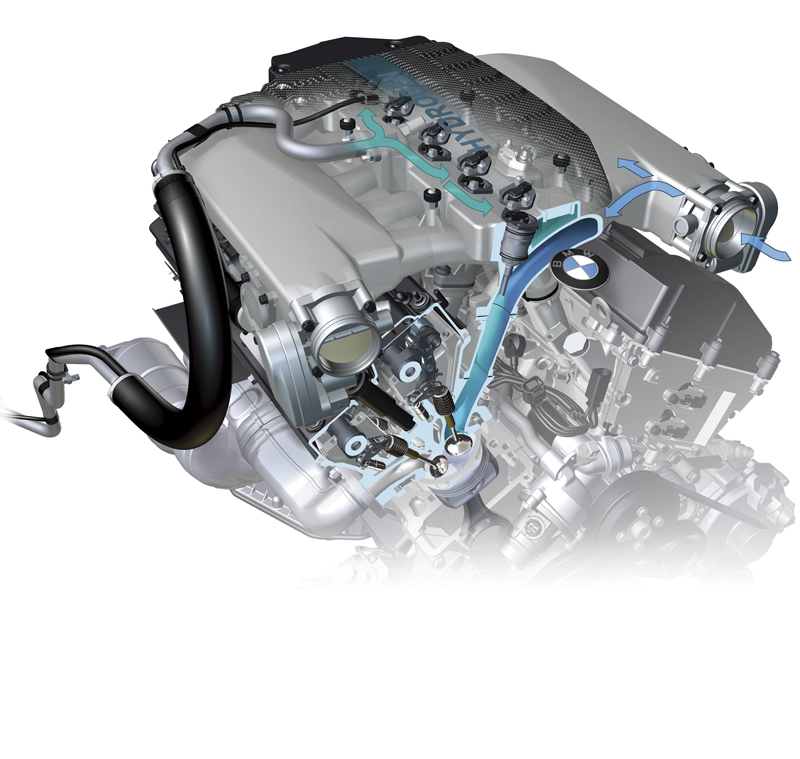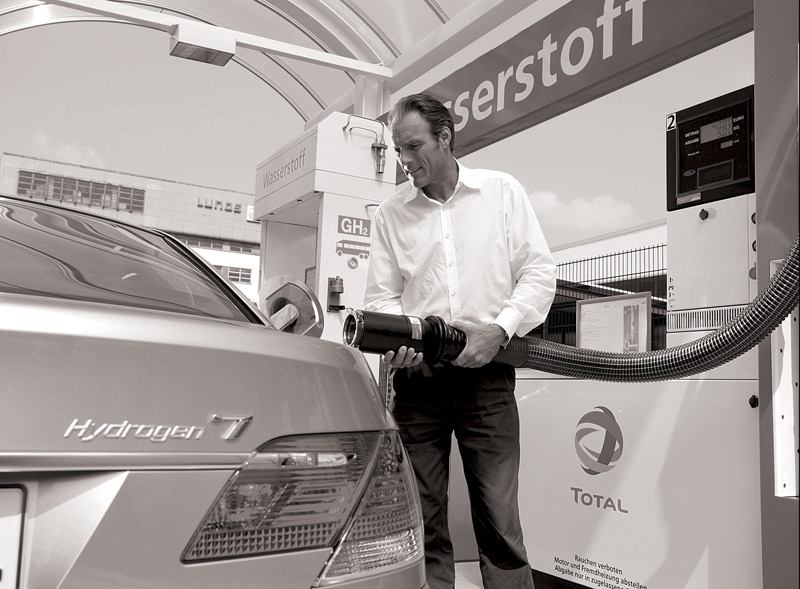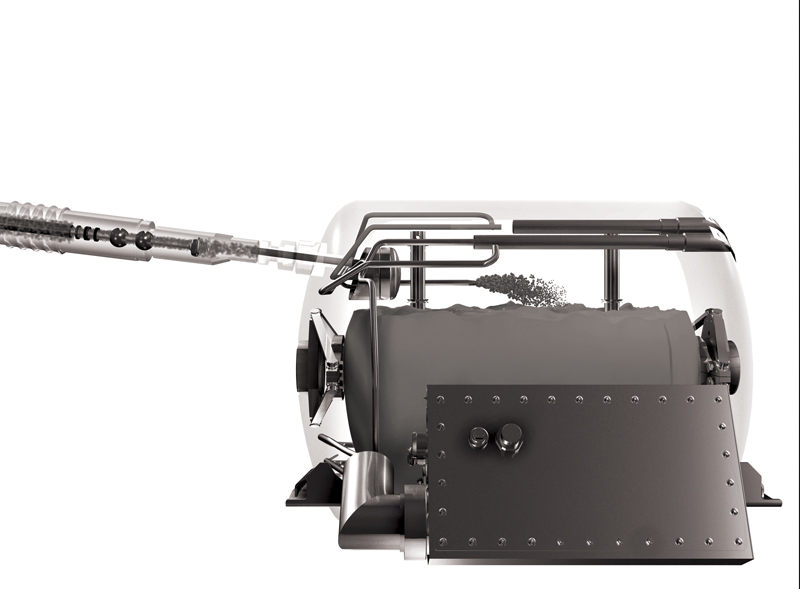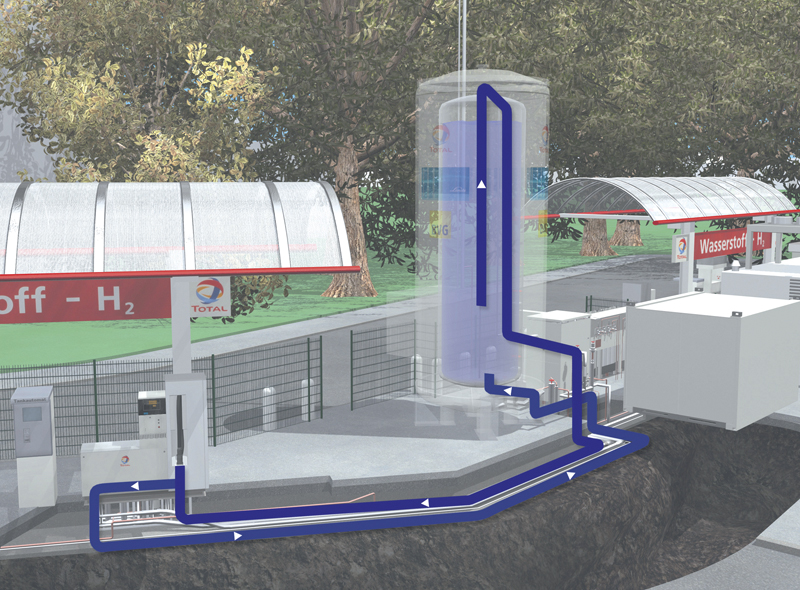

The 6-liter, 12-cylinder engine in the BMW Hydrogen 7 runs on either hydrogen or gasoline. Sophisticated control systems allow the driver to switch between fuels without any disruption in performance.
BMW has made a major leap in alternative fuel technology with the introduction of its developmental Hydrogen 7 car. The vehicle is “bi-fuel,†capable of running on either hydrogen or gasoline. The driver can make a seamless switch between fuels as the car is running. In hydrogen mode, the car emits virtually nothing but water vapor, while providing the performance and comfort 7-series owners expect.
Although there is a tremendous amount of research into alternative fuel technology, many experts believe hydrogen is the only energy source that could potentially replace fossil fuels for automotive use. Hydrogen is one of the most common elements in the universe. It is part of every atom of water and is found in most organic compounds which means hydrogen is easily recycled and has no bad effects on the environment. In theory, hydrogen fuel could be used forever. The water vapor released by burning hydrogen would be recycled by the environment, available to be extracted over and over again for use as a fuel.

Special equipment is needed to refuel a hydrogen powered car, but the process is essentially the same as filling up any gasoline or diesel powered vehicle.
It will be years before you see a hydrogen powered BMW in your service bay. Despite the fact that hydrogen is abundant, there are still many difficult problems to be resolved before hydrogen can realistically replace petroleum. However, the fact that BMW has the first hydrogen-powered luxury car on the road is a big step toward drastically cutting the world’s need for fossil fuels to operate our vehicles.
Engine Modifications

In addition to a conventional gas tank, the BMW Hydrogen 7 car has a specially designed hydrogen storage tank. The hydrogen tank holds about 34-37 gallons of liquid hydrogen, stored at -250° C.(-418° F.). Dual walls, consisting of multiple layers of aluminum and fiberglass provide the insulation needed to keep the hydrogen liquid.
BMW Hydrogen 7 is powered by a twelve-cylinder, internal combustion engine. The car reaches 100 km/h (62 mph) in 9.5 seconds and has a top speed of 230 km/h (143 mph). The car has a range of about 125 miles when using hydrogen, plus another 310 miles when switching over to gasoline.
By adapting conventionally gasoline powered engine to also use hydrogen, BMW eliminated the technology hurdles that the development of a dedicated hydrogen engine would face. When running on gasoline, the engine uses a direct fuel injection system. In hydrogen mode, the hydrogen is mixed with air in the intake manifold before being injected into the engine. The Hydrogen 7 stores liquid hydrogen in its tank. The liquid is converted to a gas when it is injected into the intake manifold
BMW developed new injection valves to blend the hydrogen with the air in the manifold. The valves are larger than conventional gasoline injection valves and are designed to handle a wide variation in volume flow than a typical gasoline injection valve.

One major barrier to hydrogen use is the need for a completely new infrastructure
to produce, distribute, and dispense hydrogen fuel.
Hydrogen burns up to ten times faster than gasoline, which forced BMW engineers to develop a complex fuel management system for the Hydrogen 7. Using BMW’s exclusive fully variable VALVETRONIC valve management system, plus BMW’s variable double-VANOS camshaft adjustment, the onboard computers optimize hydrogen combustion.
The gasoline is stored in a conventional gas tank. Storing the hydrogen required the development of a unique, low pressure tank that keeps the hydrogen in a liquid state at very low temperatures.
Offering BMW performance, quality, and comfort, but with virtually no emissions at all, the Hydrogen 7 represents a major development in alternative fuel technology. With BMW’s approach, when these cars start showing up at your shop, you won’t have to learn a completely new technology like you would for fuel cells and electric powered cars. All you have to do is think hydrogen instead of gasoline as the power source, just about everything else remains the same.


0 Comments